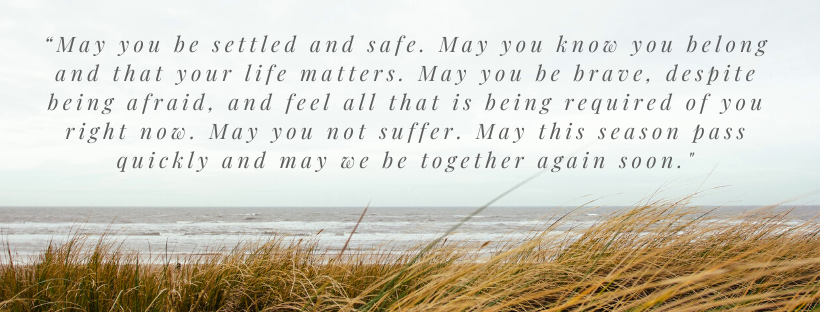 As we navigate a world in the middle of a pandemic, the one constant experience for all of us is... change. What was working yesterday does not work today. What was planned yesterday will not be happening today. How you felt yesterday is not what you feel today. Change. Constant change. Human beings are not typically big fans of change. Especially change we are not in control of. We all showed up on this planet earth with brains hard-wired to see the negative more than the positive. This obvious lack of control makes every non-verbal warning system in our bodies start firing. The feeling is clear - DANGER! When it comes to an unknown virus circulating freely in the world, feeling some fear is expected and will likely do what healthy fear is supposed to do. Fear will get us motivated to wash our hands, exercise social distancing, and adapt in a world we did not ask to be in. Fear will remind us to let go of control and adapt to the new normal in front of us. Fear will also make you tired. In very over simplified biology, the chemicals released during a fear response are designed to have us fight or run for our life. They are powerful. And exhausting. You may call your fear something else like anger, sadness, anxiety or depression. It is pretty obvious we are all dealing with the COVID-19 threat differently. But, at the core, this is a time of collective fear. Of universal trauma. As we have moved into a new way of living via Zoom and technology, most of us have had to make super hard decisions. What is safe and what is not, in a world where no one seems to know for sure? Decision fatigue is exhausting and real. And, wow, the life changes we are required to accept! The sadness and longing for a life before COVID-19 is also a universal experience. For everyone who: Had graduation canceled Postponed a wedding Closed a business Cannot be close to loved ones Is being required to work despite being afraid Didn’t get to go on the first, second or third date Is home with family and doesn’t feel safe Lost a job Is overwhelmed by the requirement to homeschool Lost health insurance Has dipped into the bottom of savings Lost your retirement in the stock market Is desperately trying to navigate the unemployment system Cannot accompany a family member to the hospital as they fight this disease Cannot have a spouse or partner with them during labor and delivery Cancelled vacations and conferences and dream experiences Is home and hungry Does not have a large enough space outside their home to get fresh air and still be able to social distance For those in chronic pain that is now considered “elective” and appointments are cancelled Is afraid for the future of their children For the cancelled birthday celebrations For the deaths and funerals that cannot be mourned together For the cancelled community gatherings, book clubs, yoga classes, pot lucks, girls night out, man cave poker nights, concerts, church services, critical moments of belonging For the inability to go to the grocery store and buy what we want to buy For all of us. Acceptance of this magnitude will leave you spent and fatigued beyond imagination. We are living a universal experience that has universal requirements. This time, this place, this world we live in, calls us to compassion as never before. Compassion for self, for others, and for our world. Compassion is simply the desire that we not suffer, combined with genuine concern. This is not pity and it is not a waiving of your own rights. It is, however, a recognition of connectedness and moving forward with an awareness of that belonging. Compassion gives us the strength to try again, love instead of lashing out, feel instead of stuffing away and denial, accept what we cannot change, and help instead of hurt. As a defense mechanism, it can become quite common for us to tell others, and even ourselves, to “let it go” and to negate an experience by saying something like “this is ridiculous”, “you are upset over nothing” or “it could have been worse”. No one feels better after hearing those statements, especially if said inside our own head. Here is an exercise to help: Allow yourself time to think about how you feel in the midst of the fear, the change, and the fatigue. Notice where your body may ache from carrying the stress, notice where your emotions are high or where you feel irritated or angry, notice the thoughts that may be swirling in your head. Bring to mind the feeling when someone has shown compassion for you before. Then, bring to mind someone or something that is easy for you to to feel compassionate and let that compassion flow from your heart and mind. You can even say “may you not feel ___”, “may you not suffer”, or “may you be ok”. Extend and repeat this exercise to someone else in need, the community in which you live and the world at large. Extend and repeat this over and over again for yourself. You deserve and need your self-compassion as never before. For all of us, the compassion we extend from Whole Health:
1 Comment
|
Whole Health
© 2019 WHOLE HEALTH BLUFFTON | NUTRITION FOR YOUR SOUL | BLUFFTON, SC

